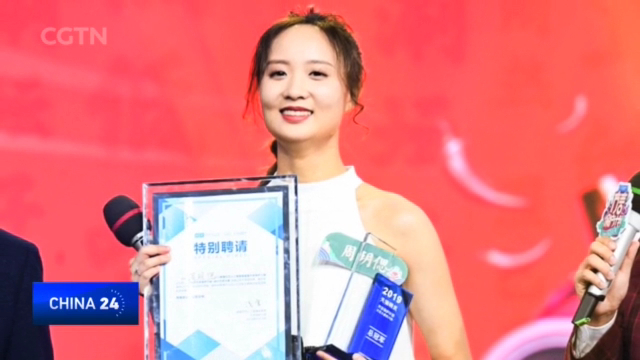
21:43, 21-Jul-2019
Dialect Protection: Dialect champion said she's not the face of her dialect
Updated
21:59, 21-Jul-2019

All over China, there are many different people speaking different accents and dialects. There's one dialect in Sichuan province, home to China's famous pandas, that some may find interesting and even amusing to learn. CGTN reporter Xu Xinchen sat down with a voice actress from Sichuan who recently won a dialect competition.
This is my attempt to learn the local dialect in Southwest China's Sichuan Province. Apparently, I needed more practice. The phrase means a popular local snack. While it sounds similar to Mandarin in Sichuan dialect, it was quite hard to get the sounds right. And the difference between the local dialect and Mandarin Chinese is not just about sounds.
ZHOU YUECAI VOICE ACTRESS "Phrases in Sichuan dialect may not just mean what you hear. There are teasing elements hidden within."
As a voice actress from Sichuan, Zhou Yuecai recently won a competition for speaking Sichuan dialect. And she shared a joke about how Chinese phrases in Sichuan dialect could totally mean something different.
ZHOU YUECAI VOICE ACTRESS "A reporter from outside the province went to report a bus accident (in Sichuan). The reporter asked a passenger if they had any tools to help them get out. The passenger angrily said there was a hammer! The reporter thought the passenger was referring to the safety hammer on the bus. But in fact, the passenger really meant there was nothing. "Hammer" is a phrase used to get things off from someone's chest in Sichuan dialect."
I joined one of her recording sessions for an audio book. And she specially did the piece in Sichuan dialect for us. While people may not understand Chinese, it was quite easy to spot the different emotional patterns when speaking different dialects. First, Mandarin.
"Dear gentlemen, you just finished your tea and alcohol."
And now, let's hear the Sichuan dialect version.
"Dear gentlemen, you just finished your tea and alcohol."
Being a voice actress for Zhou means speaking Mandarin most of the time during work hours, but she finds opportunities to keep her local dialect rooted.
ZHOU YUECAI VOICE ACTRESS "As a voice actress, I speak Mandarin most of the time. But I am surrounded by people who speak Sichuan dialect. I need to speak it when I can if I want to get close with them. And people may need to give up some of their home dialects if they want to go to other provinces and even go abroad."
Despite winning the dialect competition, she doesn't think it is possible for one individual to represent the entirety of regional dialects. Dialects vary slightly across different cities in Sichuan — and the differences come from different local cultural scenes. Xu Xinchen, CGTN, Chengdu.
SITEMAP
Copyright © 2018 CGTN. Beijing ICP prepared NO.16065310-3
Copyright © 2018 CGTN. Beijing ICP prepared NO.16065310-3